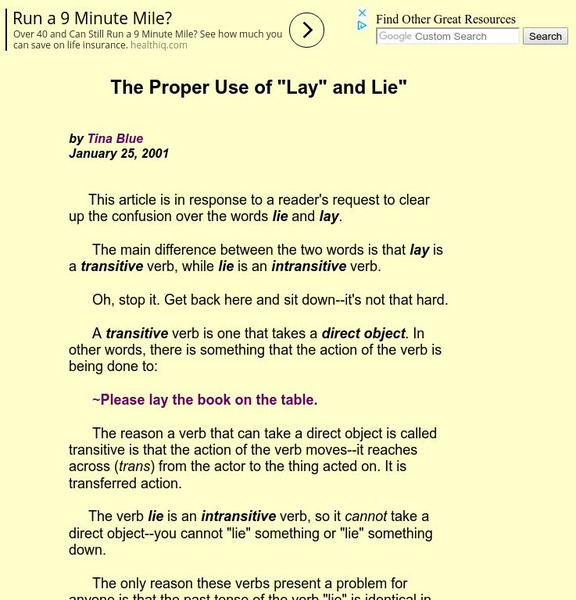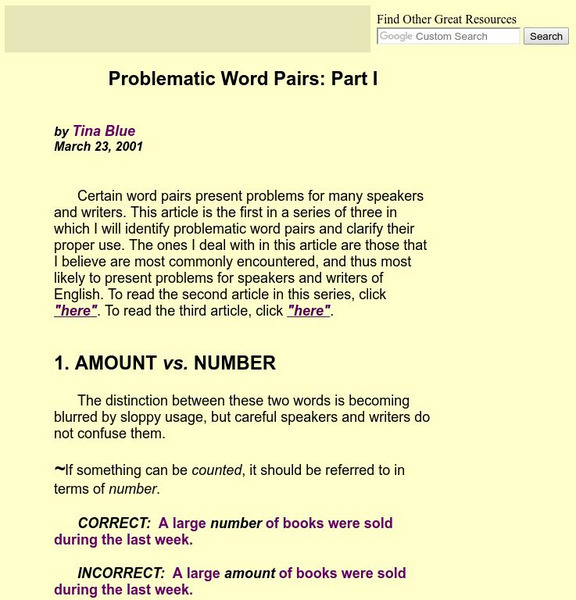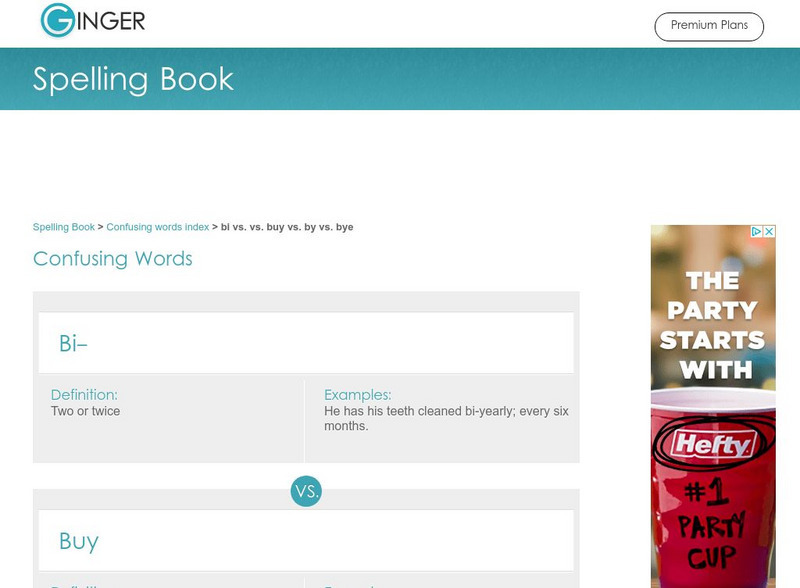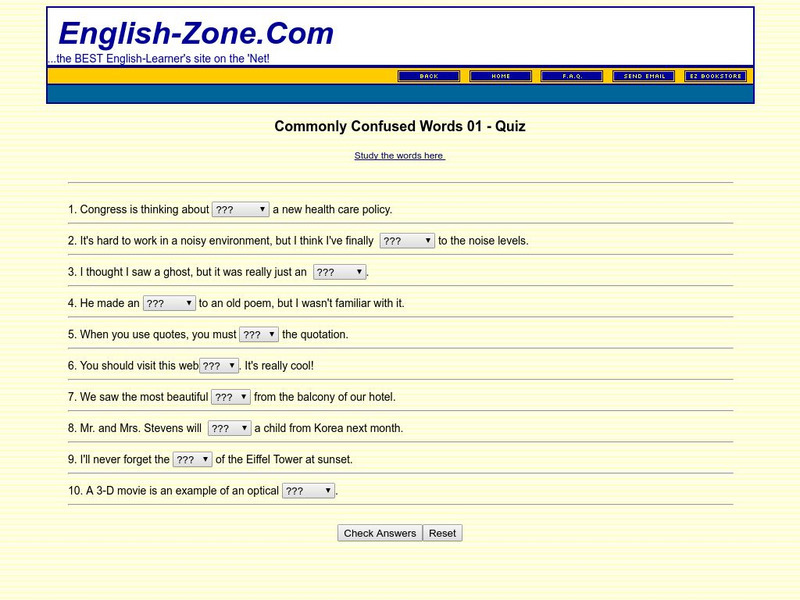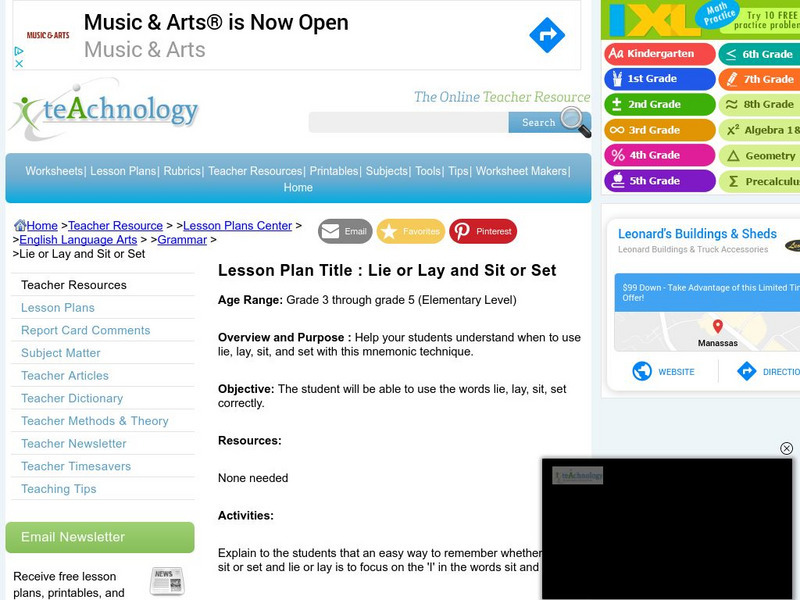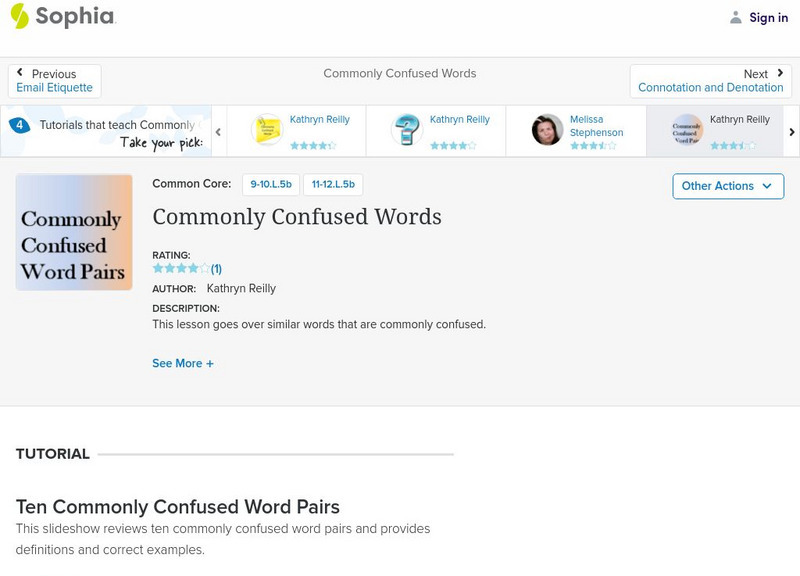PBS
Pbs Learning Media: Some Frequently Confused Words
Some words in English can look and sound similar, but have entirely different meanings. Keep an eye and ear out for them; beware of commonly confused words. [0:40]
Khan Academy
Khan Academy: Frequently Confused Words: Too to Two
Can you tell the difference between the words 'to,' two,' and 'too'?
Khan Academy
Khan Academy: Frequently Confused Words: There Their They're
Do you know when to use 'there,' 'their,' and 'they're'?
Khan Academy
Khan Academy: Frequently Confused Words: Here Hear
Can you identify the difference between the words 'here' and 'hear'?
Khan Academy
Khan Academy: Frequently Confused Words: Assorted
Can you identify when to correctly use these words that often get confused with other words?
Khan Academy
Khan Academy: Frequently Confused Words: Affect/effect
Do you know when to use 'affect' and when to use 'effect'?
Khan Academy
Khan Academy: Choosing Between Its and It's
This is one of the most common slip-ups you can make in English! Let's give it a shot.
Ambleside Church of England Primary School
Ambleside Primary School There, Their, They're Test
Keeping they're, there, and their straight is an important spelling skill. Practice with this interactive quiz.
Grammar Tips
Learn the Difference Between "Imply" and "Infer"
This article explains the difference between these commonly confused words.
Grammar Tips
Grammar Tips: The Proper Use of "Lay" and "Lie"
Check this brief explanation of how to tell the difference between lay, a transitive verb, and lie an intransitive verb, and use them properly in English grammar.
Grammar Tips
Who, That, Which
Need a quick reference for when to use who, that or which? This article offers a concise explanation.
Grammar Tips
Grammar Tips: Problematic Word Pairs: Part I
Certain word pairs present problems for many speakers and writers such as amount versus number, continuous versus continually, and so on. This three-part article identifies problematic word pairs and clarifies their proper use.
Grammar Tips
Problematic Word Pairs: Part Ii
This is the second in three articles that demonstrates such confusing word pairs as "continuous," which means unbroken, and "continually," which describes something that occurs repeatedly over a period of time.
Grammar Tips
Problematic Word Pairs: Part Iii
Use this list to help you find the correct usage of nine different pairs of commonly misused words.
Towson University
Towson University: Commonly Confused Words: Then and Than
This entry explains the difference in meaning and usage of the words "then" and "than," gives examples of each, and provides a link to a page of practice exercises.
Other
Weber State University: Misused Words and Phrases
A fun look at the wrong way to use the English language; includes many examples.
Other
Oxford University Press: Oxford Dictionaries: Affect or Effect: A Visual Guide
This is a dictionary entry explaining how to use affect and effect using comic pictures.
Other
Ginger: Spelling Book: Confusing Words: Bi, Buy, By, Bye
Definitions and examples of the commonly confused homophones bi, buy, by, and bye.
English Zone
English Zone: Confusing Verbs: Raise/rise
This tutorial defines the words, shows sample sentences, and offers a practice exercise in which students select the correct verbs to fill the blanks in the sentences. Both Java and non-Java forms available.
Other
Santa Monica College: Decent, Descent, or Dissent?
Read the definitions and examples of these commonly confused words: decent, descent, or dissent. Then complete five sentences to practice this skill.
English Zone
English zone.com: Commonly Confused Words 01 Quiz
Definitions of seven commonly confused words (adapt/adopt, allusion/illusion, cite/site/sight) followed by ten sentences where students choose the correct words to fill in the blanks. When finished, students can check their answers to...
Other
University of Hawaii: Quiz Maker: Advice/advise
This learning module focuses on the commonly confused words advice and advise including definitions and a practice activity,
Teachnology
Teachnology: Lesson Plan: Lie or Lay and Sit or Set
This lesson focuses on the correct usage of the words Lie or Lay and Sit or Set and an easy mnemonic technique to help them remember when to use each.
Sophia Learning
Sophia: Commonly Confused Words: Lesson 4
This lesson goes over similar words that are commonly confused. It is 4 of 4 in the series titled "Commonly Confused Words."










